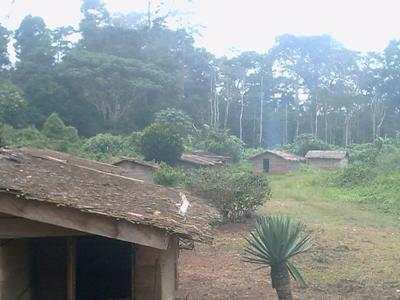Bakker Nongni Mola'a
Global Village Cameroon plans to train the population living around the Deng Deng forest on environmental best practices and sustainable management of forest resources.

The population of Deng Deng live closer to their forest as it is a source of their livelihood. They say the forest is the backbone of their community.
The Rufford Small Grants has funded a three months environmental education programme in the East province of Cameroon in Deng Deng forest. This project will be executed by Global Village Cameroon an organisation that promote sustainable development and environmental protection, through Bakker NONGNI an Environmental Jurist and WIRSIY Emmanuel Binyuy an Environmentalist. Global Village Cameroon plans to train the population living around the Deng Deng forest on environmental best practices and sustainable management of forest resources. The Deng Deng forest has suffered too much from forest resource exploitation and poaching. Earlier in the 1970s this forest suffered from fragmentation by the construction of Cameroon railway line and recently a portion of this forest has been programmed to be flooded by the proposed Lom Pangar project dam. The Environmental Impact Assessment studies for Lom Pangar dam project has just been published and reading through it GVC realised that impacts on biodiversity have been marginalised. With all this torments that the forest has gone through and will still go through, it becomes necessary for the local population to be sensitised on the need for sustainable forest management and the need to stop poaching.
What will Global Village Cameroon do?
Global Village Cameroon will sensitize the local population on the need to manage forest resources sustainably and stop poaching. This programme will include the training workshop for teachers of schools and focal points from each group or association in the village and the production of wall pictures demonstrating sustainable forest resource management, film presentation of success stories of sustainable forest resource management. There will also be the sensitisation of traditional rulers of all the villages concerned, through meetings with them, in order to engage them in the campaign for sustainable forest management. All these trainings, with these various groups of people, will be geared towards transmitting this message to their other communities members. The primary and secondary school teachers, who will be trained, will improve on their environmental education skills so as to better teach school pupils and students respectively. Global Village Cameroon will also organise school competitions and give prizes to the best students and pupils that come up with poems, dramas, songs, drawings and written articles demonstrating the need for sustainable management of the environment especially the Deng Deng forest. There will also be lobbying and advocacy meetings with government officials in the forestry sector, to push them tilt more attention to the Deng Deng forest.
What made Global village Cameroon engage in this project?
GVC has been leading in the campaign against the construction of the dam project in the Lom Pangar region where the Deng Deng forest is found. Part of this forest is protected as Deng Deng forest reserve, but suffers from no management and lack ecogards. The Deng Deng forest has Africa’s last forest hardwood and host large numbers of gorilla, chimpanzees and other animals classified by the government of Cameroon and IUCN as totally protected. GVC while carrying out this campaign was shocked with the rate of poaching and timber exploitation from this forest.
What should be the outcome of this project?
GVC will change peoples mentality and behaviour through this EE programme as one of the long lasting contribution to nature conservation especially in the Deng Deng forest. GVC will also come out with findings on the living condition of this people and diagnose what makes them engage in poaching and over exploitation of the forest resources so as to search for long lasting solutions in the long run after this project. This will be done by searching for financial means to provide the population with alternative sources of livelihood. We hope to see the government engage fully in the management of the forest by providing ecogards, other staff and giving this forest a status of a sanctuary in a short run.